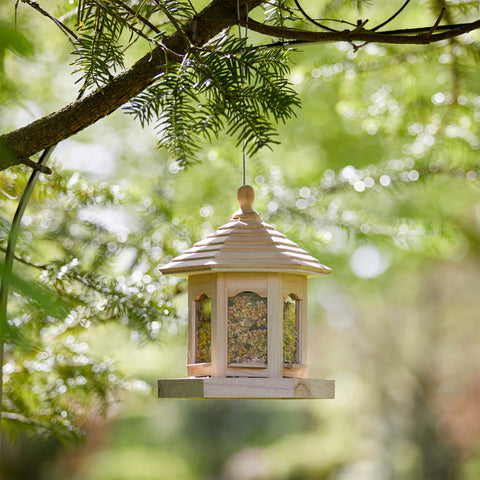Winter Wonderland - December in the garden
As we enter the winter months and you decorate your Christmas tree, you may think the garden has been put to bed. However, don’t forget your outdoor space as there are still a few jobs to be done to keep the garden ticking over so it's in its prime come next spring . Here’s our quick guide to December gardening jobs and what to do in the run up to the Christmas break.

Plants
December is the time for pruning to encourage new growth for the next season. Cut back climbing roses that have any diseased or damaged growth to tie in any new growth for support. Prune dormant trees, shrubs and hedges, grape vines, clematis and fruit trees before the end of the year to ensure they spring back next season.
Lift any remaining dahlia tubers once their foliage has been blackened by frosts and store them somewhere dry and cool until spring.
Move your containers of shrubs or tender plants into a sheltered spot, clustering them together helps protect the root systems from suffering frost damage, or insulate with horticultural fleece.
If the ground is not too frosty, it is also to prepare soil for next year’s plants and crops by digging over empty borders, removing weeds and stones, and digging in soil conditioners such as manure, compost and bone meal to ensure it is rich in nutrients for the new year.
Winter is a good time to plant hedges such as beech, hornbeam and quickthorn and plant bare root roses and trees whilst they are still dormant. If your garden’s looking a little dark during the shorter days, you add colour with some eye-catching displays of winter bedding, evergreen shrubs, conifers and winter stems of dogwood.
Flower seeds you can sow in December undercover include cyclamen, sweet peas, geraniums, snapdragons, begonia and antirrhinum. If you have a vegetable garden, this time of year is perfect to sow vegetable seeds such as broad beans, onions, garlic and winter greens.

Garden Maintenance
The autumn leaves have now fallen to the ground, make sure you rake or leaf vacuum and clear them regularly, especially when the temperatures drop, which will result in an icy, slippery surface. Keep pathways and driveways safe and clear regularly
There is also the chance that fallen leaves could cause damage to the grass. If the leaves get soaked by rain or start to rot, they can encourage weeds to grow, especially if there are large blankets of leaves on your lawn. Add to your compost heap or store in a separate pen for rotting down into a rich and nutritious leaf-mould.
Most pests and diseases are dormant in winter, but it’s still worth checking for snails and slugs in sheltered places, such as in your containers, cold frame or greenhouse.
The break over Christmas and new year also provides the perfect time to wash garden tools and wipe them with oil to help prevent them rusting whilst not in use. Get secateurs and lawn mower blades sharpened, fix any garden tools that may have suffered from use and wash your gardening gloves.
Take a moment to re-organise your shed and greenhouse too, before spring arrives!
Wildlife
Winter is an important time for garden birds so make sure you provide bird food to supplement their diets during the cold snap. Choose energy-rich bird food that contains suet, nuts and oil-rich seed such as sunflower hearts for your bird feeders.
Birds eat all sorts of insect pests so are very beneficial to your garden. Leave some berries on plants such as holly and pyracantha – they are food for wildlife and the birds will thank you when food
Remember to provide fresh water in bird baths regularly and ensure it doesn’t freeze over so avian visitors have a place to drink and bathe.
If you have a pond, make sure it doesn’t freeze over. Although pond life is well adapted to winter cold, shallow ponds can be kept clear with a floating ball.
Hedgehogs need help build up their fat reserves in time for the colder months so we recommend putting out a shallow dish of water and some meaty flavoured tinned cat or dog food in your garden.
Hedgehogs also hibernate throughout winter, so a house to keep them safe from bad weather and predators will give them a safe shelter during this period.




























